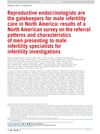 5 citations,
August 2020 in “Dermatologic Therapy”
5 citations,
August 2020 in “Dermatologic Therapy” Most YouTube hair loss treatment videos are popular but often biased and lack reliable sources.
 3 citations,
January 2006 in “Dermatologic Surgery”
3 citations,
January 2006 in “Dermatologic Surgery” The International Society of Hair Restoration Surgery established a curriculum in 2005 to standardize knowledge and skills for treating hair loss, emphasizing it as a multidimensional specialty.
 June 2008 in “Dermatologic Surgery”
June 2008 in “Dermatologic Surgery” The International Society of Hair Restoration Surgery created a standard curriculum in 2008 to guide doctors in diagnosing and treating hair loss effectively.
 October 2019 in “International journal of clinical & experimental dermatology”
October 2019 in “International journal of clinical & experimental dermatology” Female pattern hair loss greatly affects quality of life, especially in younger patients, those with the condition for a long time, and those with mental health issues. A more comprehensive treatment approach is suggested.
 September 2023 in “Medical & Clinical Case Reports Journal”
September 2023 in “Medical & Clinical Case Reports Journal” Platelet-Rich Plasma (PRP) may increase hair density and thickness in Androgenetic Alopecia, but it's not significantly better than a placebo.
 June 2023 in “International journal on recent and innovation trends in computing and communication”
June 2023 in “International journal on recent and innovation trends in computing and communication” Combining multiple algorithms predicts hair fall more accurately than using single algorithms.
 January 2006 in “Dermatologic Surgery”
January 2006 in “Dermatologic Surgery” The Core Curriculum for Hair Restoration Surgery aims to improve doctor training for better, safer, and more natural-looking hair loss treatments.
 51 citations,
December 2011 in “The Journal of Dermatology”
51 citations,
December 2011 in “The Journal of Dermatology” New treatments for severe hair loss often fail, but some patients see hair regrowth with specific therapies, and treatment should be tailored to the individual's situation.
July 2016 in “Biometrics & Biostatistics International Journal” New guidelines using video aim to ensure honest reporting of hair loss treatments.
 37 citations,
May 1999 in “Australasian Journal of Dermatology”
37 citations,
May 1999 in “Australasian Journal of Dermatology” Early diagnosis and treatment are crucial for preventing permanent hair loss in various scalp conditions, and while new treatments are promising, more research is needed to evaluate their effectiveness.

OCT can effectively screen and diagnose various medical conditions non-invasively.
 10 citations,
September 2022 in “Psychiatry and Clinical Neurosciences”
10 citations,
September 2022 in “Psychiatry and Clinical Neurosciences” Long COVID affects over half of COVID-19 survivors, causing a range of symptoms like fatigue and neurological issues, with no specific treatment yet.
 21 citations,
September 2018 in “International journal of women’s dermatology”
21 citations,
September 2018 in “International journal of women’s dermatology” People with Lichen planopilaris are more likely to have certain autoimmune and endocrine disorders but less likely to have conditions like allergies and diabetes.
 April 2024 in “Remedium Journal about the Russian market of medicines and medical equipment”
April 2024 in “Remedium Journal about the Russian market of medicines and medical equipment” Pharmacy workers need more education to better help people with hair loss.
December 2021 in “Digital Doctor”  December 2023 in “Aesthetic Cosmetology and Medicine”
December 2023 in “Aesthetic Cosmetology and Medicine” COVID-19 can cause hair loss, but specialists can help treat it.
 1 citations,
April 2022 in “Revista Da Associacao Medica Brasileira”
1 citations,
April 2022 in “Revista Da Associacao Medica Brasileira” COVID-19 can cause different types of hair loss, and proper diagnosis by a specialist may be needed.

The book is a detailed guide on hair growth issues and treatments, recommended for specialists and hospital libraries.
 7 citations,
July 2011 in “Survey of Ophthalmology”
7 citations,
July 2011 in “Survey of Ophthalmology” The document concludes that periocular hair disorders have various causes and treatments, and proper evaluation by specialists is important for management and prognosis.
 4 citations,
January 2016 in “Postepy Dermatologii I Alergologii”
4 citations,
January 2016 in “Postepy Dermatologii I Alergologii” Many hair diseases, including those caused by medications and psychological issues, can lead to hair loss and require proper treatment and specialist care.
 June 2011 in “The Journal for Nurse Practitioners”
June 2011 in “The Journal for Nurse Practitioners” Up to half of adult women may experience hair loss, and doctors should use medical history, exams, and tests to find the cause and treat it.
 68 citations,
January 2007 in “Journal of Cosmetic and Laser Therapy”
68 citations,
January 2007 in “Journal of Cosmetic and Laser Therapy” Laser/light treatments for hair loss are popular but lack scientific data proving effectiveness.
 5 citations,
March 2011 in “Journal of pediatric health care”
5 citations,
March 2011 in “Journal of pediatric health care” The girl with autoimmune hair loss might regrow hair within a year, and treatments can help but not prevent recurrence; dermatologist referral and corticosteroids are recommended.
 1 citations,
January 2011 in “The annals of clinical and analytical medicine”
1 citations,
January 2011 in “The annals of clinical and analytical medicine” Hair mesotherapy showed improvement in hair growth and thickness without side effects.
 January 2012 in “Postgraduate obstetrics & gynecology”
January 2012 in “Postgraduate obstetrics & gynecology” Up to 50% of women may experience significant hair loss by age 50, with various causes and treatments available.
 July 2002 in “Dermatologic Surgery”
July 2002 in “Dermatologic Surgery” The book "Hair Restoration: Micrografts and Flaps" is a useful guide for beginners in hair transplantation, covering techniques, postoperative care, and various types of alopecia.
 40 citations,
July 2017 in “Frontiers in Medicine”
40 citations,
July 2017 in “Frontiers in Medicine” Early and personalized treatment for hair loss in young people is crucial to prevent permanent damage and should include psychological support.
 January 2012 in “Postgraduate obstetrics & gynecology”
January 2012 in “Postgraduate obstetrics & gynecology” Up to half of women by age 50 experience significant hair loss, with various types and treatments available.
 26 citations,
July 2019 in “Fertility and Sterility”
26 citations,
July 2019 in “Fertility and Sterility” Reproductive gynecologists are the main referrers for male infertility evaluations in North America.

The document says hair loss can happen after recovering from COVID-19 and it can cause psychological discomfort.




























